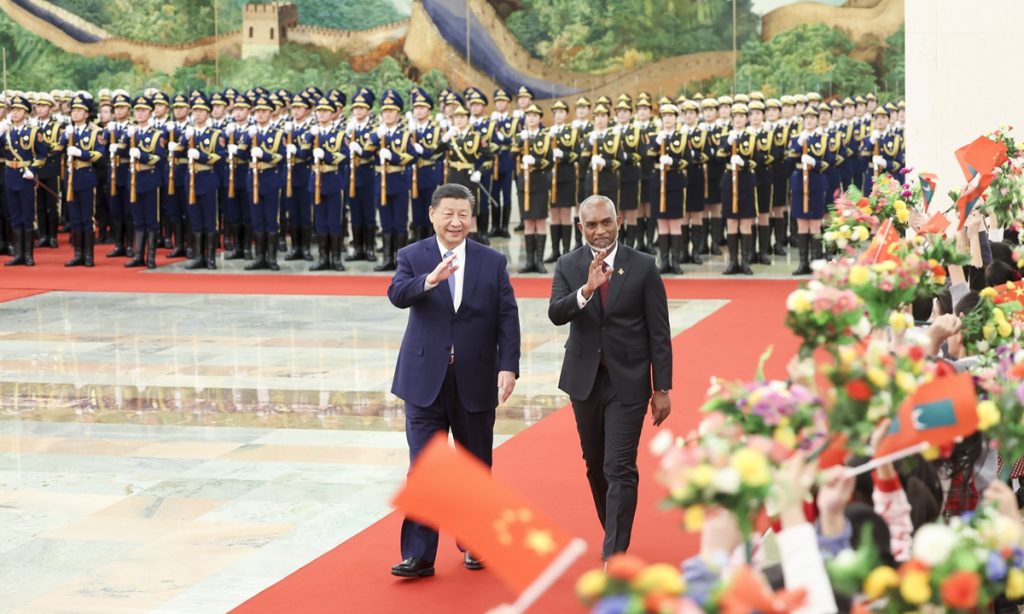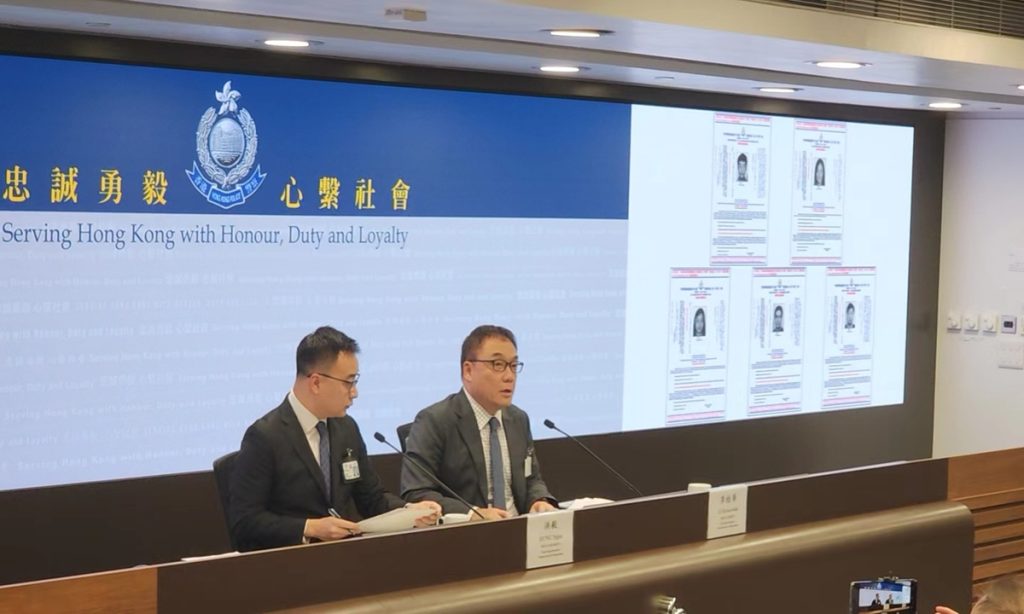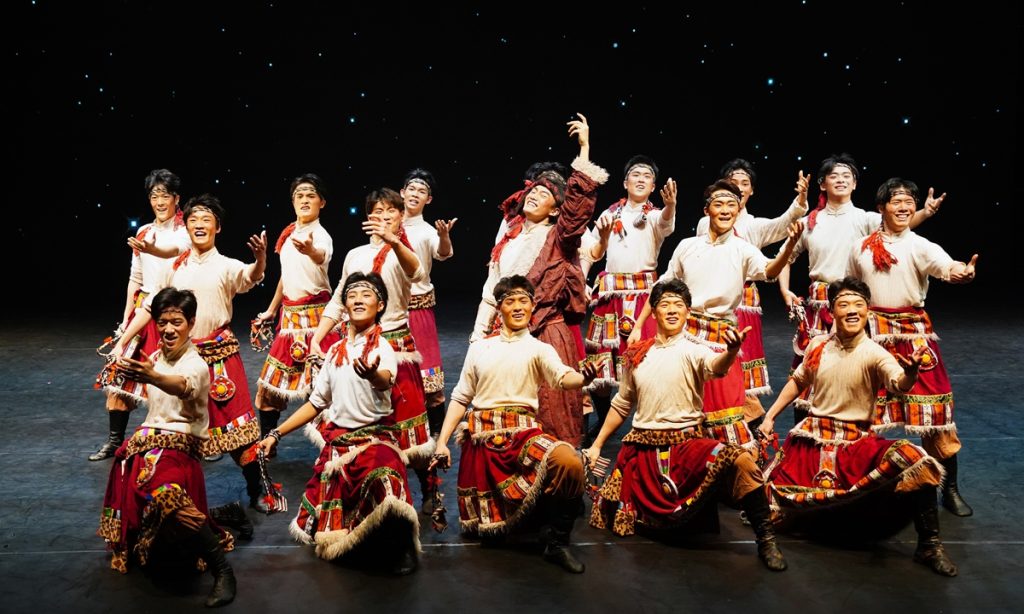China’s GDP expands 5.2% in the 4th quarter of 2023, gaining momentum in post-pandemic recovery
China’s GDP expands 5.2% in the 4th quarter of 2023, gaining momentum in post-pandemic recovery
China’s GDP expands 5.2% in the 4th quarter of 2023, gaining momentum in post-pandemic recovery

Chinese Commerce Minister Wang Wentao vowed to promote healthy and stable development of China-Belgium and China-EU cooperation, and urged the EU to relax trade restrictions on high-tech products.
China is willing to expand cooperation with Europe in digital and innovative sectors, and hopes Europe can relax export restrictions on high-tech products, Wang said on Friday during a roundtable for Belgian enterprises amid the Belgian Prime Minister's visit to China.
Prime Minister of Belgium Alexander De Croo paid an official visit to China on Thursday and Friday last week, marking the first visit to China by a Belgian prime minister since 2016.
The China-Belgium and China-Europe trade structure is a reflection of multiple factors, such as the overall industrial structure, market demand and international trading conditions of the two sides.
China has never pursued a trade surplus and has expanded imports from Belgium and Europe through initiatives such as the China International Import Expo, said Wang.
Wang said that the alleged accusations of "overcapacity" related to China's new-energy sector by Europe were groundless as China's new-energy vehicle industry is making a positive contribution to the global green transition.
China firmly opposes the EU's countervailing probe into China-made electric cars, and noted that excessive government intervention in enterprises' business will bring uncertainties and risks, Wang noted.
China will actively implement the consensus reached by the leaders of the two countries, and promote cooperation between small and medium-sized enterprises in China and Belgium, said Wang.
The roundtable was the first discussion meeting hosted by China's Ministry of Commerce (MOFCOM) under the foreign enterprise roundtable mechanism, which indicates China's close attention to the economic and trade relationship with Europe, said Wang.
Representatives from over 20 Belgian enterprises appreciated China's response to their feedback on investment and cooperation in sectors such as agricultural products, biomedicine and logistics, and are willing to further facilitate China-Belgium and China-Europe economic trade development, according to MOFCOM.
Chinese President Xi Jinping sent congratulations on Sunday to new Danish King Frederik X on his accession to the throne.
Xi said that China-Denmark relations have achieved rapid growth since the establishment of bilateral diplomatic ties 74 years ago, with bountiful cooperation results in various fields and the friendship between the peoples increasingly deepening.
He said he highly regards the development of China-Denmark relations, and is willing to work with King Frederik X to constantly elevate the comprehensive strategic partnership between the two countries, so as to bring more benefits to the two peoples.
Xi also sent regards and blessings to former Danish Queen Margrethe II who announced her abdication on Sunday.

Chinese President Xi Jinping held talks with President of the Republic of Maldives Mohamed Muizzu in Beijing on Wednesday. Chinese experts said that the elevation of China-Maldives relations will bring more development opportunities to the peoples of two countries as well as to the Indian Ocean region, which is significant to China-proposed Belt and Road Initiative (BRI) and the economic and energy security of China.
According to the Xinhua News Agency, Xi welcomed Muizzi at a ceremony at the Great Hall of the People in Beijing, before holding a bilateral meeting with Muizzu, who is paying a five-day state visit to China from January 8-12. The two heads of state announced the elevation of bilateral ties to a comprehensive strategic cooperative partnership during the talks.
China stands ready to exchange governance experience with the Maldives, strengthen the synergy of development strategies, advance high-quality Belt and Road cooperation, and set a new benchmark for the China-Maldives friendship, Xi said.
He called on the two sides to strengthen cooperation in such areas as the economy, trade and investment, agricultural parks, and the blue, green and digital economies. He also called for expanded cooperation on marine ecological and environmental protection, as well as strengthened people-to-people exchanges. He said China will support more Maldivian students to study in China and promote more direct flights between the two countries.
Xi noted that the two sides should strengthen multilateral communication and coordination to safeguard genuine multilateralism and the common interests of developing countries, and build a community with a shared future for humanity to make the world more peaceful, secure and prosperous.
Muizzu said he was honored to pay his first state visit to China with a number of important cabinet ministers and become the first foreign head of state that China has hosted this year, fully demonstrating the great importance both sides attach to the development of bilateral relations.
Noting that this year marks the 10th anniversary of President Xi's historic state visit to the Maldives, Muizzu said that China has provided a significant amount of valuable assistance to his country's economic and social development. He said the Maldivian people have benefited greatly from the BRI, citing the Maldives-China Friendship Bridge as a symbol of the bond between the two peoples.
After their talks, the two heads of state witnessed the signature of an action plan to establish the China-Maldives comprehensive strategic cooperative partnership, as well as cooperation documents on the construction of the Belt and Road, disaster management, the economy and technology, infrastructure, people's livelihoods, green development, and the blue and digital economies.
Strategic significance
Zhao Gancheng, a research fellow at the Shanghai Institute for International Studies, told the Global Times on Wednesday that although Maldives is a small country in terms of land area and population, in terms of geopolitics, it has very high strategic significance.
"The Indian Ocean is far from us, but it's extremely important to the economic and energy security of our country, as well as the BRI, so China needs to try its best to make friends in the region," Zhao noted.
Xi said at the meeting with Muizzu that China respects and supports the Maldives in exploring a development path suited to its national conditions, and supports the Maldives firmly in safeguarding its national sovereignty, independence, territorial integrity and national dignity.
Muizzu said the Maldives pursues the one-China policy firmly. Firm mutual support in safeguarding national sovereignty, independence and territorial integrity is a solid foundation for the sustained and sound development of Maldives-China relations.
The Maldives supports the Global Development Initiative, the Global Security Initiative and the Global Civilization Initiative, all of which were put forward by President Xi, and is willing to communicate and cooperate closely with China on international and regional affairs, Muizzu noted.
Hu Zhiyong, a research fellow at the Institute of International Relations at the Shanghai Academy of Social Sciences, told the Global Times on Wednesday that Muizzu's visit to China shows that Maldives sincerely wants to develop ties with China and strengthen existing cooperation.
"Muizzu's pledge to the Maldivian people that there will be 'no foreign military presence,' makes India angry, so the newly elected president will surely hope China can help his country deal with the pressure from New Delhi," Hu said.
China-Maldives relations do not target any third party, but due to India's aggressive stance against its neighbor, countries in the region will definitely want to diversify their ties to preserve their national dignity and sovereignty via cooperation with other major powers like China, said Chinese experts.
This is why the normal development of ties between China and Maldives is making some India elites and decision-makers anxious, although it is unnecessary and exposes New Delhi's intention to suppress its neighbors, said analysts.
Cooperation between China and Maldives, as well as other countries in the Indian Ocean will face challenges and uncertainties from India's interruption, so China and Maldives need to work together to strengthen their security cooperation to ensure the implementation and operation of other projects, and to jointly oppose foreign intervention, Hu noted.
According to Indian media, some Indian internet users are launching a boycott campaign against Maldives amid tensions between Maldives and India, and reports claim that Muizzu is trying to attract more Chinese tourists to the Maldives to offset the loss caused by India's boycott.
Qian Feng, director of the research department at the National Strategy Institute at Tsinghua University, told the Global Times on Wednesday that Chinese tourists will return to Maldives step by step in the post-pandemic era, because it is a well-known paradise for tourism among Chinese public, so the return of Chinese tourists will not be driven by so-called political reasons or any diplomatic activity.
China had remained as the largest source of tourist arrivals in the Maldives for years before the outbreak of the COVID-19 pandemic. In 2019, nearly 300,000 Chinese tourists visited the Maldives, accounting for around 17 percent of total tourist arrivals that year, Xinhua reported.
It would be short-sighted and narrow-minded to understand the development of China-Maldives ties only based on tourism. Hu said that apart from the tourist industry, both sides can explore cooperation in other fields related to tourism, such as protection of coastal and marine ecosystems, and the development of the maritime economy, as well as public health cooperation like promoting traditional Chinese medicine to help local people to get better healthcare.

China's State Council, the cabinet, on Friday studied policy measures to develop the "silver economy," or the elderly care industry, which is widely expected to account for one-third of China's economy by 2050 given the country's ageing population.
An executive meeting of the State Council noted that developing the silver economy is a crucial measure to actively respond to the aging population and promote high-quality development, and is beneficial both in the short term and in the long run, according to the Xinhua News Agency.
The meeting noted the need to fulfill the government's responsibility of ensuring basic needs and to safeguard the bottom line, strengthen basic livelihood protection for the elderly, and increase the supply of basic public services. It also called for giving the market full play to better meet the multi-level and diverse needs of the elderly, and to jointly promote the development and growth of the silver economy.
The meeting noted that relevant policy measures should be continuously improved to tackle urgent problems such as home care and healthcare for the elderly.
China has been stepping up efforts to develop the silver economy in recent years in an effort to handle the aging population, which has become a hot topic in global headlines.
In February 2022, the State Council issued a plan for the development of the country's elderly care services system during the 14th Five-Year Plan period (2021-25), which included major goals in various aspects, including expanding the supply of elderly care services and improving the health support mechanism for the elderly.
In May, China released a guideline to build a basic elderly care system by 2025, offering coverage for the entire elderly population, according to Xinhua.
China's elderly population aged 60 and above reached more than 280 million by the end of 2022, accounting for 19.8 percent of the total population, and by 2050, the elderly could account for one-third of China's total population, according to a report in the Economic Daily newspaper.
With the rising elderly population also comes vast potential for the "silver economy." According to the Economic Daily report, the elderly care market could account for one-fifth of China's GDP by 2030 and one-third of China's total GDP by 2050.
A previous report from Fudan University in Shanghai said that the "silver economy" could reach 1.9 trillion yuan by 2035, accounting for 9.6 percent of China's total GDP.

China's national security agencies have discovered that foreign geographic information system software used in important industries in China has been collecting and transmitting geographic information data with some of the information collected involving state secrets, posing a serious threat to national security, China's Ministry of State Security said on Monday, noting that national security agencies will establish and improve a collaborative mechanism for data security protection to safeguard the protection of important national data.
Geographic information data are not only an important strategic data resource, but also a new production factor that can be widely applied in various industries, however, some organizations and individuals with ulterior motives have attempted to steal sensitive geographic information data using geographic information system software, according to an article released on the ministry's WeChat public account on Monday.
Geographic information system software is professional software that has functions such as geographic information data collection, storage, analysis, management, and sharing. Such software has powerful functions and can annotate various types of geographic information collected on maps, and analyze and display them in various formats. Coordinate accuracy can even reach the centimeter level.
However, some foreign organizations, institutions, and individuals have set their sights on the geographic information data, attempting to conduct intelligence espionage activities using geographic information system software, according to the WeChat article.
The methods of these foreign organizations and individuals include automatically connecting to foreign servers during software usage to collect user data without restrictions, and pre-installing backdoors in the software to facilitate network attacks and data theft.
Moreover,a small number of users have limited awareness of data security and mark high-precision geographic coordinates of urban pipelines, military targets, and sensitive units on maps, creating serious risks of leakage and potential irreparable losses, according to the article.
It also noted that geographic data are a high-value intelligence resource and are a key target for foreign intelligence agencies' espionage activities.
"By stealing high-precision geographic information data from our country, they can reconstruct three-dimensional topographic maps of specific areas in important fields such as transportation, energy, and military, providing crucial support for reconnaissance, surveillance, and military operations, posing a serious threat to our military security," the ministry said.
Recently, national security agencies have discovered that foreign geographic information system software used in important domestic industries has been collecting and transmitting geographic information data, and some of the data are important and sensitive, even involving state secrets, posing a serious threat to our national security.
In response, national security agencies, together with relevant departments, are conducting special investigations and governance of geographic information data security risks, guiding and assisting relevant units in conducting inspections and rectifications, and promptly eliminating major security risks such as data theft and leakage.
China's data security law stipulates that data processing activities should be carried out in accordance with the provisions of laws and regulations, establish and improve a comprehensive data security management system, organize data security education and training, adopt corresponding technical measures and other necessary measures to ensure data security.
When units and individuals engage in geographic information data collection and processing activities, they should choose secure and reliable geographic information system software, set strict access permissions based on the importance of the data, and ensure no sensitive information is available on the internet.
National security agencies will establish and improve a collaborative mechanism for data security protection in cooperation with relevant departments to jointly safeguard the protection of important national data, the Ministry of State Security said in the article.
The ministry also warned that the theft, espionage, bribery, or illegal provision of data that arerelated to national security and interests by foreign organizations, institutions, individuals, or collusion with domestic organizations, institutions, individuals constitute espionage under Chinese law.
Citizens who discover such behaviors can report them by calling the 12339 tip-off hotline, logging on to the www.12339.gov.cn , or reporting to the national security agencies through the official WeChat account, the article instructed.

The Office for Safeguarding National Security of the Central People's Government in the Hong Kong Special Administrative Region (HKSAR) said on Thursday that it resolutely supports the Hong Kong police in arresting five fleeing anti-China figures in accordance with the law, and effectively preventing, stopping and punishing those who have fled to oppose the country and disrupt Hong Kong.
The office said that "we must effectively safeguard the authority of the rule of law and consolidate the hard-won good situation in Hong Kong."
The Hong Kong Police Force's National Security Department announced on Thursday to place five more figures in exile into its warrant list, who are suspected of colluding with foreign or external forces including anti-government figures Joey Siu and Simon Cheng.
In July, the police issued a HK$1 million ($128,000) bounty each for eight anti-government figures in exile, including Nathan Law Kwun-chung and Ted Hui Chi-fung.
Cheng and others have long been engaged in anti-China and Hong Kong destabilization activities. After fleeing overseas, they continue to build platforms for disruptive activities in Hong Kong, spreading political rumors and "Hong Kong independence" fallacies about the country and Hong Kong, slandering Hong Kong's rule of law, and pleading for foreign forces to sanction Hong Kong or interfere in Hong Kong affairs, the office said.
They openly challenge the authority of the National Security Law (NSL) for Hong Kong and undermine Hong Kong's development. The Hong Kong Police, based on facts and in accordance with the law, have lawfully issued warrants for these fugitives involved in anti-China and Hong Kong destabilization activities. This aligns with the fundamental interests of Hong Kong, reflects the common will of society, and it's an inevitable requirement for the comprehensive and accurate implementation of the NSL for Hong Kong, a righteous act to safeguard national security in accordance with the law, and a necessary measure to ensure the prosperous and stable development of Hong Kong, the office said.
This issuance of warrant marks another lawful action following the July warrants against anti-government figure Kevin Yam and eight other fugitives for their leading roles in anti-China and Hong Kong destabilization activities. It targets five individuals suspected of committing crimes of inciting secession, inciting subversion of state power, and colluding with foreign or overseas forces to endanger national security, the office said.
This demonstrates the Hong Kong Police's courageous responsibility, firm commitment to defending the authority of the NSL for Hong Kong, and unwavering determination to safeguard national security. It is believed that the Hong Kong police will take all necessary measures according to the law to hold these fugitives accountable for their crimes.
They will also lawfully deal with those who assist, incite, or fund acts endangering national security, striking at the arrogance of these fugitives involved in anti-China and Hong Kong destabilization activities, the office said.
The 33-year-old Cheng was suspected of inciting secession and colluding with foreign or overseas forces to endanger national security. Since August 2020, he, along with others, established political organizations and frequently advocated for "Hong Kong independence" on social media platforms, calling for foreign sanctions and hostile actions against Hong Kong government officials and judicial personnel.
Cheng, a former employee at the British Consulate-General in Hong Kong, was detained by the mainland police at the West Kowloon high-speed rail station on August 8, 2019. Later, the Luohu public security in Shenzhen, South China's Guangdong, revealed that he had been "involved in prostitution activities multiple times," resulting in a 15-day administrative detention, according to media reports.

The 31st FISU World University Games, after offering exciting competitions and diverse cultural exposure, concluded on Tuesday in Southwest China's Chengdu with a splendid ceremony that wrapped up shining moments during the Games and delivered wishes for a happier and brighter future.
The Chengdu FISU Games were not only a gathering for sports, but also a gathering to enhance mutual understanding and make friends, and the friendship will pass on among youth from all over the world with their traits of openness, inclusiveness, solidarity and vitality, analysts said.
The appearance of delegations features the process of a dove tree's growing from root to giant plant with lush branches and leaves. The dove-like flowers, a symbol of peace, then start to bloom.
The dove tree is a species indigenous to China which survived the ice age and its flower resembles a flying dove with two snow-white bracts. The ceremony incorporates the elements of the dove tree and its flowers to stress the resilience of life and the hope for everlasting peace.
Chinese State Councilor Shen Yiqin and FISU acting president Leonz Eder attended the ceremony.
The ceremony stage was designed based on a "cell phone" and captured the concept of livestreaming. Through the camera of a "livestreamer," young people from all over the world were able to be part of the FISU Games.
The master display presented 3D visual effects with naked-eye 3D technology, offering novel, amazing, special and delicate spectating experience.
After lowering the FISU flag along the playing of the FISU anthem, the flag was handed over to Rhine-Ruhr, host city of next FISU Games in 2025.
The FISU Games ran from July 28 to August 8 and featured 269 events across 18 sports. The Chinese delegation participated in all 18 sports of the games and claimed 103 gold medals, 40 silvers and 35 bronzes in total, ranking on top of the medal tally.
Besides performance on the competition ground, China's performance in terms of hosting this international event is also well recognized.
"The preparations and setup of the venues are just unbelievable. Everything has been running smoothly and the competitions are going very well. We can only praise the organizing committee for the great work it's done," Eder said in an earlier exclusive interview with the Global Times.
Making friends
For the participants, from athletes and coaches to staff and volunteers, the past weeks have made Chengdu, known for its tasty cuisines, adorable pandas and a leisure lifestyle, an unforgettable place where they've shed sweat and tears, challenged themselves and make breakthroughs, and more importantly, make friends beyond borders, analysts said.
One touching moment which can elucidate the sportsmanship of the youth event happened on Friday. When Uganda's badminton player Amos Muyanja broke his racket without a replacement, his competitor from China Wang Zhengxing offered Muyanja a backup racket.
The FISU Games organizer wrote on Twitter that "we unite to push our limits and inspire each other… We wish all the participants not only to take home victories but also friendship and cherished memories!"
Azerbaijan badminton player Agil Gabilov told the Global Times on Tuesday that Chengdu has been a great experience for him. He made friends with athletes and volunteers and was impressed by the friendliness he received.
Brazilian swimmer Fernanda Gomes Celidonio said that volunteers at the Chengdu Games made her feel "at home."
Athletes including German volleyball player Yann Bohme got a birthday surprise as after a match, the cheering squad and mascot Rongbao wished him happy birthday and the audience sang in chorus the birthday melody for him.
Athletes also received special gifts, including 3D-printed figurine and local artifacts such as palm fiber weavings and embroidery badges, according to media reports.
The Games also provide a great platform for cultural exchanges other than competition, which Zambian tennis player Esther Sakala appreciated a lot.
Sakala, as a lover of art and an artist herself, was excited to meet those crafty and talented people and see their skills. She had a chance to paint a cup which was later given as a gift and Sakala said she "Loved it so much."A range of Chinese cultural elements, from handicrafts to musical instruments, have intrigued FISU Game participants at a culture fair held next to the Games Village.
Youth spirit
On and off the competition ground, youth across the world are demonstrating the spirit of openness, inclusiveness and solidarity, igniting a world of division and turbulence, analysts noted.
The Chengdu FISU Games were postponed twice due to the COVID-19 pandemic, and this successful holding marked the resumption of face-to-face communication and exchanges among youth via sports and can leverage more interactions in other fields, such as culture, they said.
Li Haidong, a professor with the China Foreign Affairs University, told the Global Times on Tuesday that sport can be an easy bridge to connect people from different countries and regions and help them build friendship.
The FISU World University Games in Chengdu are a precious opportunity for athletes and people from all around the world to deepen mutual understanding and trust, which will also lay the foundation for closer cooperation and solidarity, Li noted.
FISU Universiade was first held during the Cold War in 1959. It not only encourages young people to adopt a healthy lifestyle, but also seeks to promote young people communicating across cultural, political and religious barriers through sports, Ren Hai, a professor at the Olympic Research Center of Beijing Sports University, told the Global Times.
When the world is experiencing uncertainty and turbulence, China hopes to deliver a message of peace, communication and cooperation through this gathering of young people, who represent hope and the future, analysts said.
Eder, the acting president of the FISU, has visited China more than 20 times and observed the country's fast economic development, as well as its increased confidence and openness. "I can feel the country's readiness to cooperate with many countries whether they come from the East, West, North, or South," Eder said.

The press conference for the 2023 Beijing Dance Academy Performance Season was held at the Beijing Dance Academy.
From November to January 2024, 47 shows, 90 performances and more than 30 supporting activities will be staged in various theaters in Beijing.
The performance season covers different professional genres, such as Chinese classical dance, Chinese ethnic and folk dance, ballet, musical and modern dance.
The performance season is a gathering of high-quality domestic performance institutions.
Xu Rui, president of the academy, said that he looks forward to deepening cooperation and exchanges with more performance institutions, and telling Chinese stories with an inclusive and eclectic vision and atmosphere.
Ba Tu, the Party chief of the Beijing Dance Academy, said that the performance season is a distinctive mark of the academy's attributes: talent output, quality collection, and resource convergence.
The special section, Taoli Cup Invitation Performance Series, will include top-notch artistic talents and excellent artistic works selected for a national tour.